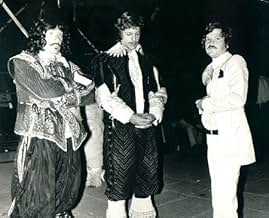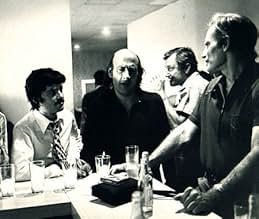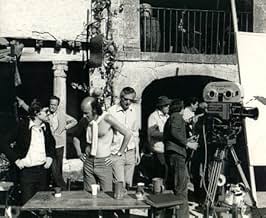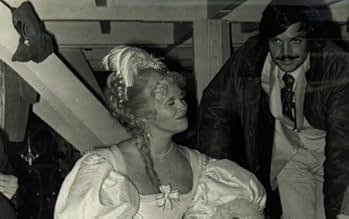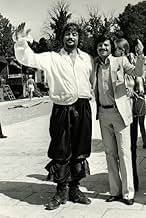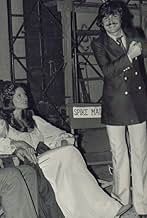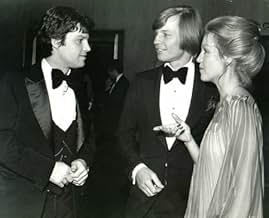IMDb RATING
7.1/10
21K
YOUR RATING
A young swordsman comes to Paris and faces villains, romance, adventure and intrigue with three Musketeer friends.A young swordsman comes to Paris and faces villains, romance, adventure and intrigue with three Musketeer friends.A young swordsman comes to Paris and faces villains, romance, adventure and intrigue with three Musketeer friends.
- Director
- Writers
- Stars
- Nominated for 5 BAFTA Awards
- 4 wins & 7 nominations total
Jean-Pierre Cassel
- King Louis XIII
- (as Jean Pierre Cassel)
- Director
- Writers
- All cast & crew
- Production, box office & more at IMDbPro
Featured reviews
Richard Lester did what no one before or since has been able to do: tell Dumas' story as magnificently as it deserves to be told. This tale gets told again and again in Hollywood, but leave it to a European to do it right. The cinematography, sets, and costumes are all fantastic, but they aren't all clean and impossibly perfect like the 1948 Gene Kelly or 1993 Kiefer Sutherland versions. Lester infuses this familiar story with an energy and tone that made his work with the Beatles successful. Yes, "The Three Musketeers" is an intriguing adventure, but the humor in their friendship, that's what draws me in again and again. And what an amazing cast he had to work with: all the Musketeers are perfect, especially big Oliver Reed, who can be silly, witty, and scary all in the same scene. The supporting cast is full of great actors, including Charlton Heston (having fun at being evil here), Christopher Lee (gets to mix deadpan humor in with his menace), Raquel Welch (cast as beautiful but clumsy, really enabling her to be a character and not just a live mannequin), Spike Milligan (doing what he does best), and most wonderfully Faye Dunaway (seductively evil: my favorite kind!). And, of course, holding it all together as D'Artagnan is Michael York, who never found a greater role.
Besides handling the shifts in tone well, Richard Lester also had the great rare luxury of breaking Dumas' large novel into two seperate movies which he filmed simultaneously. This really allows for greater character development and a truly epic scale. All of the other film versions try to cram all of that plot into 120 minutes. Not only is it impossible (in the 1993 version they simply change it completely using only the basic idea of Dumas' book), but it makes this huge complicated story with many threads seem contrived and ridiculous (the 1948 version has such dramatic and sudden shifts of tone - from wacky comedy, to romance, to heavy drama - that it can confuse and lose the audience).
This is great moviemaking.
Besides handling the shifts in tone well, Richard Lester also had the great rare luxury of breaking Dumas' large novel into two seperate movies which he filmed simultaneously. This really allows for greater character development and a truly epic scale. All of the other film versions try to cram all of that plot into 120 minutes. Not only is it impossible (in the 1993 version they simply change it completely using only the basic idea of Dumas' book), but it makes this huge complicated story with many threads seem contrived and ridiculous (the 1948 version has such dramatic and sudden shifts of tone - from wacky comedy, to romance, to heavy drama - that it can confuse and lose the audience).
This is great moviemaking.
10radiopal
Alexandre Dumas would more than likely applaud this particular version of his fantastic novel. I remember when I was a kid and first saw the movie in the theater... I was stunned at the cinematography (yeah, a film buff even at 12). After leaving the theater, I went to a nearby bookstore and bought my first copy of the novel. Wow, how impressed was I when I realized that Richard Lester and George MacDonald Fraser stuck to the concept of the novel. The novel, incase you haven't read it, is funny and fun. The first half of the book... kept me at edge of my seat. When I recently re-read the novel, my wife would tell me that I would wake her up sword fighting in my sleep. Anyway, back to the movie. Michael York as D'Artagnan was fabulous. He embodied the dweeb that we all now and love as the future Commander of the King's Musketeers. Oliver Reed gave the best performance of his life as Athos. Richard Chamberlain as Aramis... the Musketeer who wants to be a priest was entertaining, and a delight. And Frank Finley as Porthos (and later came to realize that he was also O'Reilly... Buckingham's jeweler) was tremendous. Richard Lester should have been nominated for an Academy award for his direction of this masterpiece, numerous members of the cast (including Christopher Lee as Compte Rochefort, Charlton Heston as Cardinal Richelieu, Raquel Welch as Constance Bonaciuex, Spike Milligan as Monsieur Bonacieux, Roy Kinnear as Planchet, Simon Ward as the Duke of Buckingham, Faye Dunaway as Milady de Winter, and of course Jean-Pierre Cassel as Louis XIII) should have been nominated for some kind of award. The casts portrayals were direct from the Dumas novel. The sword play in the movie is the best that I have ever seen in a movie. There is none better, with the possible exception of the Four Musketeers... the rest of the novel.
If you have never seen the movie... go and get it. Watch it. Wait for it on TCM or FCM and tape it. Once you see it, you'll want to add it to your collection... or check out e-bay if your local stores don't carry it. I bought mine on e-bay and watch it at least 3 times a year. :D
If you have never seen the movie... go and get it. Watch it. Wait for it on TCM or FCM and tape it. Once you see it, you'll want to add it to your collection... or check out e-bay if your local stores don't carry it. I bought mine on e-bay and watch it at least 3 times a year. :D
10mvario
This film, and its sequel (filmed concurrently) is by far the best movie version of the Dumas novel ever produced. The cast is excellent. The sets and costumes are marvelous. The swordplay (and there is much) is possible some of the most realistic ever filmed. And it's the only Musketeer movie I am aware of in which the Musketeers actually use muskets. Authenticity seems to have been very important to the producers, as well as staying true to the novel.
Sadly a film like this wouldn't be made these days. First off the fighting would be "punched-up" with a lot of wire work. And of course Hollywood would change the story to eliminate much of the "sleeping around" characters do (today's movie heroes in this type of movie aren't usually sexually active). They would also provide some creative story editing so that a certain character who dies in the novel would survive so as to supply the requisite happy ending. Fortunately for us this version does not suffer that kind of revisionism.
If you're a fan of Dumas or just looking for a fun film with lots of realistic sword fighting then you won't want to miss this.
Sadly a film like this wouldn't be made these days. First off the fighting would be "punched-up" with a lot of wire work. And of course Hollywood would change the story to eliminate much of the "sleeping around" characters do (today's movie heroes in this type of movie aren't usually sexually active). They would also provide some creative story editing so that a certain character who dies in the novel would survive so as to supply the requisite happy ending. Fortunately for us this version does not suffer that kind of revisionism.
If you're a fan of Dumas or just looking for a fun film with lots of realistic sword fighting then you won't want to miss this.
Let me begin by expressing how refreshing it feels to watch a series of action scenes without wretched shaky cam! After seeing Guardians of the Galaxy and the new Ninja Turtles movies at the cinema recently, I had almost forgotten what it was like to have a comprehensible fight sequence.
This 1973 version of The Three Musketeers is the best version of the story I have ever seen, even better than the over-praised Gene Kelly adaptation. It's athletic, earthy, and light-hearted, paired with one of the most perfect casts ever brought together for a movie and Michel Legrand's amazing score which proves adventurous and heart-achingly romantic in equal turns.
If you love action and comedy, then I cannot recommend this enough. I never wanted it to end and cannot wait to watch the sequel.
This 1973 version of The Three Musketeers is the best version of the story I have ever seen, even better than the over-praised Gene Kelly adaptation. It's athletic, earthy, and light-hearted, paired with one of the most perfect casts ever brought together for a movie and Michel Legrand's amazing score which proves adventurous and heart-achingly romantic in equal turns.
If you love action and comedy, then I cannot recommend this enough. I never wanted it to end and cannot wait to watch the sequel.
THE THREE MUSKETEERS, Richard Lester's comic take of the oft-filmed Dumas adventure story, is not only terrific escapist fare with a brilliant cast, but stands as the most faithful adaptation of the Musketeer saga.
The very length of the novel, with it's many plot twists, had resulted in various truncated adaptations over the years, with MGM's 1948 all-star production the only previous attempt to film more than the first half of the book. Lester, however, backed by producers Alexander and Ilya Salkind, and Wolfdieter von Stein, and working from a unrepentantly bawdy script by legendary scribe George MacDonald Fraser, tackled the novel head-on, with extraordinary results.
The novel's hero, young master swordsman D'Artagnan (portrayed by Michael York at his most boyish), is clearly the product of an impoverished Gascon household, unable to read or write, but filled with dreams of heroism in the elite Musketeers, and "fighting frequent duels". Quickly embarrassed by the smoothly villainous Rochefort (Christopher Lee), and ridiculed by the mysterious Milady de Winter, the lad reaches Paris with a broken sword, but his idealism undimmed. With a borrowed sword, he then blunders into a series of challenges from the three title characters, emotionally scarred alcoholic Athos (Oliver Reed), comic buffoon Porthos (Frank Finlay), and dandified ladies' man/priest wannabe Aramis (Richard Chamberlain). When the Cardinal's Guard attempts to arrest the four as Athos and D'Artagnan begin their duel, the Gascon displays such extraordinary skill with a sword that he is happily welcomed into the band of rogues, who help him procure a servant (the wonderfully comic Roy Kinnear) and lodgings at the home of an old reprobate (Spike Milligan) and his beautiful, if klutzy young wife (Raquel Welch, in her finest comic role), who the boy immediately lusts after. The four friends then embark on a series of hilarious, swashbuckling escapades.
Meanwhile, intrigue runs rampant in the Court; the Queen (Geraldine Chaplin) carries on a clandestine affair with the British Prime Minister, the Duke of Buckingham (Simon Ward), under the oblivious eye of her husband, Louis XIII (Jean-Pierre Cassel), while evil Cardinal Richelieu (Charlton Heston, who is marvelous, 'against type') plots to publicly embarrass her, and reveal her involvement, thus provoking a war with England, and the elimination of France's Protestant faction. The object of betrayal is a multi-jeweled necklace, a gift from Louis, given by the Queen to Buckingham, with two jewels stolen during a tryst by the Cardinal's agent, Milady de Winter. The task of recovering of the necklace, and replacing the missing jewels, is given to D'Artagnan and his Musketeer allies, who 'sacrifice' themselves to help the Gascon reach England.
Climaxing in a wild free-for-all at a Royal Ball, love triumphs, Richelieu is temporarily thwarted, Milady swears revenge against D'Artagnan, and he becomes a full-fledged Musketeer, joining his love and three recovered friends to celebrate.
This constitutes only the FIRST half of the novel and movie, and the filmmakers decided to end the picture at this point, releasing a sequel, THE FOUR MUSKETEERS, a year later, which would cover the darker remainder of the story. While it was a wise decision, no one had informed the cast that they were, in fact, making two movies, and not one, at the time of filming, and the stars quickly filed suit against the Salkinds. After a brief but highly publicized court case, the cast were compensated, and the second, equally enjoyable MUSKETEER film was released.
THE THREE MUSKETEERS (and it's sequel, THE FOUR MUSKETEERS) were triumphs for Lester, the Salkinds, and the matchless ensemble of actors. The films have achieved legendary status, over the years, and taken together, stand, today, as one of the finest comic adventures ever made.
If your experience of the tale is only the more recent Disney version, do yourself a favor, and catch the Lester films. You won't be disappointed!
The very length of the novel, with it's many plot twists, had resulted in various truncated adaptations over the years, with MGM's 1948 all-star production the only previous attempt to film more than the first half of the book. Lester, however, backed by producers Alexander and Ilya Salkind, and Wolfdieter von Stein, and working from a unrepentantly bawdy script by legendary scribe George MacDonald Fraser, tackled the novel head-on, with extraordinary results.
The novel's hero, young master swordsman D'Artagnan (portrayed by Michael York at his most boyish), is clearly the product of an impoverished Gascon household, unable to read or write, but filled with dreams of heroism in the elite Musketeers, and "fighting frequent duels". Quickly embarrassed by the smoothly villainous Rochefort (Christopher Lee), and ridiculed by the mysterious Milady de Winter, the lad reaches Paris with a broken sword, but his idealism undimmed. With a borrowed sword, he then blunders into a series of challenges from the three title characters, emotionally scarred alcoholic Athos (Oliver Reed), comic buffoon Porthos (Frank Finlay), and dandified ladies' man/priest wannabe Aramis (Richard Chamberlain). When the Cardinal's Guard attempts to arrest the four as Athos and D'Artagnan begin their duel, the Gascon displays such extraordinary skill with a sword that he is happily welcomed into the band of rogues, who help him procure a servant (the wonderfully comic Roy Kinnear) and lodgings at the home of an old reprobate (Spike Milligan) and his beautiful, if klutzy young wife (Raquel Welch, in her finest comic role), who the boy immediately lusts after. The four friends then embark on a series of hilarious, swashbuckling escapades.
Meanwhile, intrigue runs rampant in the Court; the Queen (Geraldine Chaplin) carries on a clandestine affair with the British Prime Minister, the Duke of Buckingham (Simon Ward), under the oblivious eye of her husband, Louis XIII (Jean-Pierre Cassel), while evil Cardinal Richelieu (Charlton Heston, who is marvelous, 'against type') plots to publicly embarrass her, and reveal her involvement, thus provoking a war with England, and the elimination of France's Protestant faction. The object of betrayal is a multi-jeweled necklace, a gift from Louis, given by the Queen to Buckingham, with two jewels stolen during a tryst by the Cardinal's agent, Milady de Winter. The task of recovering of the necklace, and replacing the missing jewels, is given to D'Artagnan and his Musketeer allies, who 'sacrifice' themselves to help the Gascon reach England.
Climaxing in a wild free-for-all at a Royal Ball, love triumphs, Richelieu is temporarily thwarted, Milady swears revenge against D'Artagnan, and he becomes a full-fledged Musketeer, joining his love and three recovered friends to celebrate.
This constitutes only the FIRST half of the novel and movie, and the filmmakers decided to end the picture at this point, releasing a sequel, THE FOUR MUSKETEERS, a year later, which would cover the darker remainder of the story. While it was a wise decision, no one had informed the cast that they were, in fact, making two movies, and not one, at the time of filming, and the stars quickly filed suit against the Salkinds. After a brief but highly publicized court case, the cast were compensated, and the second, equally enjoyable MUSKETEER film was released.
THE THREE MUSKETEERS (and it's sequel, THE FOUR MUSKETEERS) were triumphs for Lester, the Salkinds, and the matchless ensemble of actors. The films have achieved legendary status, over the years, and taken together, stand, today, as one of the finest comic adventures ever made.
If your experience of the tale is only the more recent Disney version, do yourself a favor, and catch the Lester films. You won't be disappointed!
Did you know
- TriviaOliver Reed was severely injured and almost died when he was stabbed in the throat during the windmill duel scene.
- GoofsRichelieu refers to Buckingham as the Prime Minister of England. However, the title was not adopted until the early 1700s, and even then was an unofficial name for the First Lord of the Treasury. It was not until 1937 that it was enshrined in law as the title of the Head of Government. Although Buckingham was undoubtedly one of the most powerful members of the English Court, he had no formal position as such, as there was no equivalent of a Prime Minister: the King himself was regarded as the Head of Government as well as Head of State.
- Quotes
Cardinal Richelieu: Who is the man that accuses you?
Bonacieux: [Rochefort enters and Bonacieux points at him] That! That is the man!
Count Rochefort: Take him away.
Bonacieux: That is *not* the man!
- ConnectionsEdited into On l'appelait Milady (1974)
Details
- Release date
- Countries of origin
- Official site
- Language
- Also known as
- Les ferrets de la reine
- Filming locations
- Summer Palace, Aranjuez, Madrid, Spain(The Louvre)
- Production companies
- See more company credits at IMDbPro
Box office
- Budget
- $4,500,000 (estimated)
Contribute to this page
Suggest an edit or add missing content


